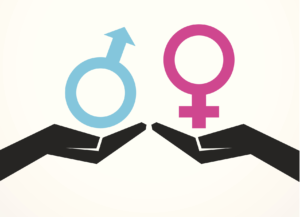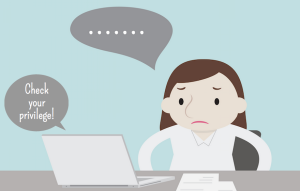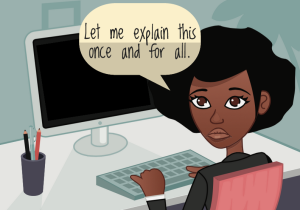I’ve sat with hundreds of clients who are breaking out of the diet/binge trap and developing a healthy relationship with food and their body.
But then they have to go out into a fatphobic, food-obsessed world where their friends, family, colleagues, acquaintances, healthcare providers, and even strangers provide them with exactly the wrong kind of advice.
Please stop!
Diet season is here, and people are already talking about their latest plan or program – just like they do every year. I usually write books and articles with a compassionate voice, and I truly understand the desperation and pain of people still stuck in the diet/binge cycle.
But it’s time to call you out if you’re talking about your latest diet, and especially if you’re trying to impose it on someone else. Even if you mean well.
I’ve put together some of the biggest complaints I hear from people who are trying to figure out how to respond to diet talk and weight loss advice – and offer suggestions for how you can help.
(A quick note: I use the first person here to describe each experience, which is a compilation from my thirty years of doing this work.)
1. I Have an Eating Disorder
I struggle with Binge Eating Disorder (BED), and yes, it’s a real thing! It’s not a matter of willpower to “just stop eating,” and I’m working with a health professional (or on my own) to normalize my relationship with food.
You may not even know I have an eating disorder – you certainly can’t tell just based on body size. Did you know that one of the biggest triggers for bingeing is the diet mentality?
So when you tell me to count points or lose weight, you’re actively feeding my eating disorder.
How You Can Help
The way to heal BED is to relearn how to honor my cues for hunger and fullness, stop categorizing foods as “good” and “bad,” and develop strategies to deal with my emotions without turning to food.
Please stop judging my food choices and my body (people with eating disorders come in all shapes and sizes).
If you’re one of a small group of people that I trust to tell about my eating disorder, check in from time to time and ask how I’m doing. If you’re a health/mental health professional and want to learn more about BED, and especially if you’re encouraging me to lose weight as part of your treatment plan, please take a look at Beyond a Shadow of a Diet: The Comprehensive Guide to Treating Binge Eating Disorder, Compulsive Eating, and Emotional Overeating.
2. You Can’t Tell My Health Status by Looking at Me
It’s not okay for you to assume that I’m not healthy because of my weight.
I may be a higher weight person who has a healthy relationship with food, is physically active, and takes good care of myself. Then again, maybe I have some of my own intentions around healthful behaviors that I’d like to accomplish. Maybe my weight will change as a side effect of those behaviors, and maybe not.
Did you know there are lots of people who fit the culture’s definition of a “healthy weight” who are using very unhealthy practices to stay there?
So when you make assumptions about my health based on my body size, you’re stereotyping me based on your own prejudices.
How You Can Help
If you’re a person I choose to discuss my health with, then let’s talk about sustainable health practices that actually matter.
Maybe we can take a walk together, because that would feel supportive to me. Perhaps you’d like to read an excellent article about the relationship between weight and health that will challenge some myths. If you’re a doctor, I’d really like you to take a look at this article about a weight-inclusive approach.
And by the way, did you know that research from the National Institutes of Health confirms what over forty other studies have shown – that people in the “overweight” category for BMI actually live the longest, and people in the first category of the “obesity” range (which accounts for the majority) have the same lifespan as those in the “normal” category?
Regardless of my health status, I deserve respect at this size, which includes the right to make my own decisions about my body.
3. Diet Conversations Are Boring
A lesson in The Diet Survivor’s Handbook reads: “Avoid diet conversations: They are boring, encourage competition among women, and keep you from knowing your true nature and spirit.”
I have to agree.
After years – even decades – of talking about the newest plan that will really work this time, I’m sick and tired of this topic. (I hope you won’t mind my saying that I also feel sorry for you that you’re still constantly feeling anxious or deprived about eating. I’ve discovered that becoming an attuned/intuitive eater gives me much more satisfaction and peace in my relationship with food.)
I’ve learned that the consequences of that weight cycling include greater risks for eating disorders, health problems, depression, lower self-esteem, and weight gain. So, when you keep talking about your diet, I’m just no longer interested.
How You Can Help
At the very least, please respect the fact that I’ll no longer contribute to conversations that encourage a preoccupation with food and weight, so I may skillfully try to change the subject.
If you continue to insist on that topic when we’re out with a group of people, I hope you’ll understand if I decide to leave the room. I’m so glad that we have time to spend together. Let’s talk about what inspires us and what challenges us. Please ask me what’s going on in my life, and I’ll do the same for you.
If you’re struggling with food or body image, there’s certainly a way we can talk about that, but I won’t collude with the idea that diets, diets in disguise, and/or the pursuit of weight loss are positive behaviors worth our time.
4. I’m Bigger Than You
I want you to know how painful it is to me when you say things like “I’m miserable because I’m too fat” and “I need to lose weight to be acceptable.”
How do you think that make me feels when I’m actually bigger than you? Are you even thinking about the effect of your words on the people around you, especially people like me who are sensitive to judgments about body size?
So when you use fat-shaming talk about your body, you also shame me.
How You Can Help
I understand that, like so many of us, you’ve internalized the cultural pressures to be thinner in order to be happy, healthy, sexy, and successful. In one way, I get that you’re not even thinking about me – your criticisms are really and truly about yourself. I’m working really hard not to take in your negative body thoughts – rather than them sticking to me like Velcro, I want them to bounce off like Teflon.
At the same time, I think some consciousness-raising is in order here.
Please think about the messages you’re conveying when you bash your own weight, especially to someone who is bigger than you.
5. Haven’t You Been Down This Path Before?
You’re talking about your diet like you’ve finally found the answer (that includes you, Oprah!). But if this isn’t your first diet, you know what happens. It’s happened to me many times.
It feels so good when the weight comes off and you feel virtuous and in control and everyone gives you compliments. I have to admit I’m a bit jealous as I watch you lose weight. But do you remember what the shame feels like when the weight comes back and no one says a word?
I do.
So even though you’re touting your latest plan to me, I remind myself that I was in the same place you are at one time when everyone was telling me how great I look – I’ve been there, done that.
How You Can Help
I think this is a place where I can help you.
I won’t be complimenting you on your weight loss like so many others will do. Please know that it’s not because I don’t care about you – I do. While I wish you well, I know the odds are stacked against you, and I don’t want to contribute to any shame you’re likely to experience if/when the weight returns.
I value you no matter what your body size.
I’ll gladly compliment you in other areas – your beautiful new scarf, your talents in music, dance, or art, your commitment to making the world a better place. All of these wonderful characteristics make you the person I like to connect with and have nothing to do with a number on the scale.
6. Dieting Actually Causes Unnatural Weight Gain
Did you know that dieting leads to a higher set point that can’t be reversed?
When I read Health At Every Size: The Surprising Truth About Your Weight, I finally got a scientific explanation for what I know to be true for myself: the more I diet, the heavier I become.
It turns out that weight is much more complex than “calories in, calories out” and that all of the weight cycling I’ve done to try to control my body has backfired. Did you know that the vast majority of people who go on a diet gain back the weight, and about two-thirds end up higher than their pre-diet weight?
So when you suggest I diet, you’re actually setting me up to become fatter than my body is meant to be.
How You Can Help
Consider reflecting on your own experience. Where are you at now compared to when you first started dieting?
I know that when I look back at pictures where I thought I was “too fat,” I now think “if only.” If only I had been taught to feel comfortable in my own skin, I wouldn’t have dieted up to my current weight.
If that’s true for you, too, let’s share our sadness at what we’ve been through and support each other in living fully in the present.
Diet companies thrive on us feeling shame about our bodies, and while just about any diet works in the short-run, they almost always fail in the long-term. Rather than blaming the diet, we end up blaming ourselves.
If we can lose the shame and blame, think about what we can gain together. We haven’t failed our diets; our diets have failed us!
7. Feeling Bad About My Body Actually Worsens My Health and Well-Being
There are so many messages that have made me feel I’m not worthy because of my weight.
From the time I was a kid, I was told that if I weren’t thin enough, no one would want to date me. I’ve had my doctor tell me to lose weight, even though all of my health markers are in the normal range.
But did you know studies show that how you feel about your weight affects physical and psychological health more than the number on the scale?
People who are unhappy with their bodies have higher blood pressure and fasting glucose levels than those who are at the same weight and feel fine about their bodies, and this is true in every BMI category.
So when you’re talking about dieting for weight loss, you’re suggesting that I should only feel good about my body at a certain size, which is actually bad for my health.
How You Can Help
I’d appreciate it if you added weight diversity as an important value.
I know you believe that we should embrace diversity when it comes to race, religion, ethnicity, gender, and sexuality. If we can talk positively about our different body sizes, it turns out we all benefit – both you and me.
8. You’re Feeding the Cultural Nonsense
You know the saying: the personal is the political.
I can’t tell you how many people – including those who are actively dieting – say that the cultural standards for thinness are ridiculous. We’ve gotten to a point where disordered eating behaviors like skipping meals, eliminating entire food categories, and guilt about food are considered normal. We make all kinds of assumptions and comments about people’s weight.
But do you realize that what we say, what we do, and even what we think matters?
So when you focus on dieting and weight loss, you’re feeding these cultural norms.
How You Can Help
Let’s all work toward changing the cultural climate about dieting, eating, weight, and body image. There’s a lot you can do to make a difference.
Stop dieting. Stop using fat-shaming talk about your body – and anyone else’s body. Don’t tell or laugh at “fat jokes.” Stop referring to food as “good” and “bad” as if it were a moral issue.
Instead, enjoy your own relationship with food by reconnecting to your signals for hunger and fullness. Learn how to eat a wide variety of foods that nourish your own unique body. Engage in behaviors that improve health and well-being without focusing on weight. Respect the natural phenomenon of weight diversity. Challenge your internalized ideas about beauty and body size.
***
I know this is hard stuff. It’s been a journey for my clients to learn how to let go of the diet mentality and find peace with food.
But as a result of this path, their lives are fuller, richer, happier. They’re no longer putting dreams on hold until they reach a certain size. They’re no longer constricting their relationship with food or constricting their lives. I hope you find that peace, too.
And if you do want to learn more about giving up diets, I encourage you to check out the many resources found in this article.
[do_widget id=’text-101′]
Judith Matz, LCSW is a Clinical Social Worker, co-author of The Diet Survivor’s Handbook (2006) and Beyond a Shadow of a Diet (2nd Edition, 2014), and author of Amanda’s Big Dream (2015). Learn more at www.judithmatz.com and sign up for the free Diet Survivor’s Group quarterly newsletter here.
Search our 3000+ articles!
Read our articles about:
Our online racial justice training
Used by hundreds of universities, non-profits, and businesses.
Click to learn more





















